Posts Tagged ‘#fear #anxiety #confidence #confidencecoach’
Anxiety due to distressing world events
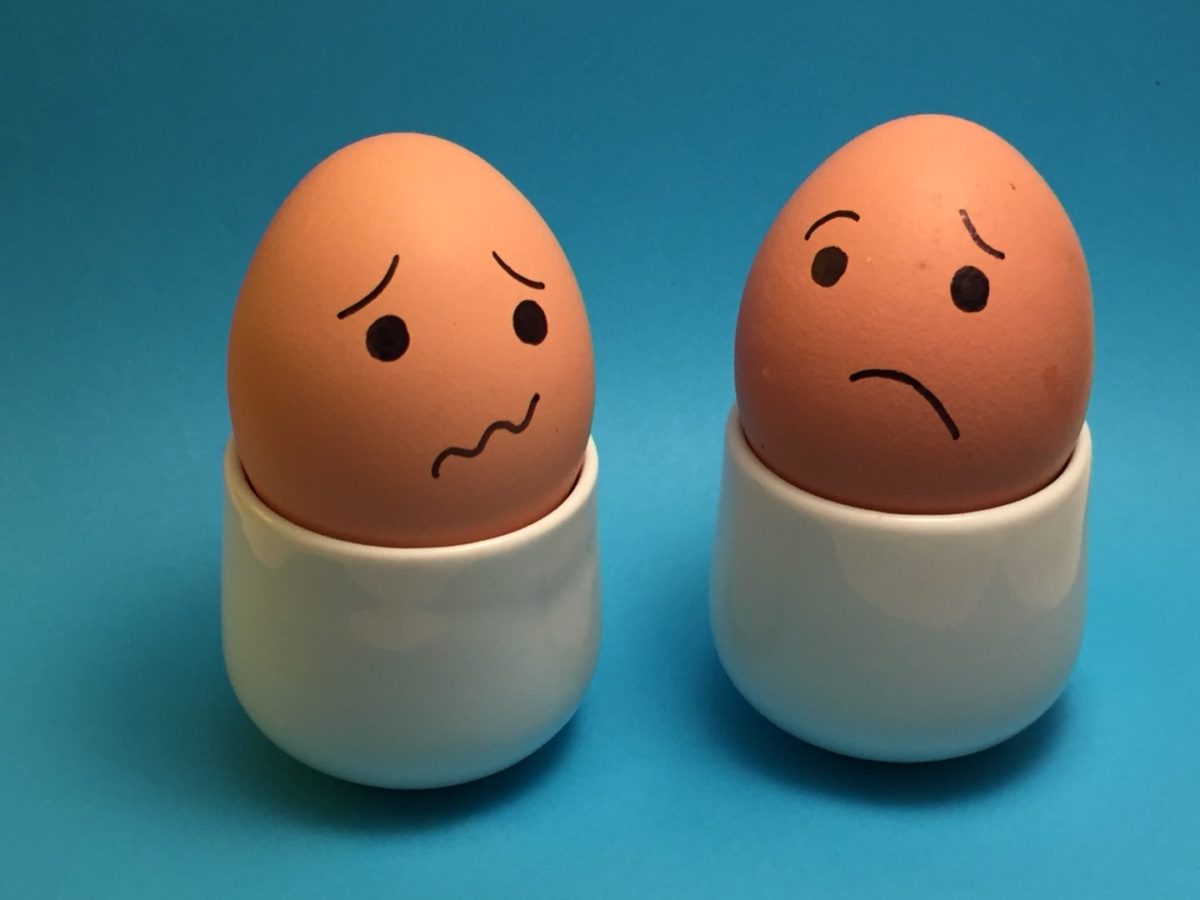
Things you can do to help reduce the anxiety and worry
It’s understandable to feel anxious about the war in Ukraine
It is natural to feel worried, anxious and upset about what is happening , to its people, and the wider impact of the war too.
What is happening to me when I feel anxious?
Feelings of Anxiety & Stress releases hormones called Adrenaline and Dopamine, which prepare us to Fight, Fright (freeze) and Flight (run) – raising our heart rate and breathing, we can get sweaty palms and feel butterflies in out stomach – usually this then settles down, after we have run away for example, or we have realised we don’t need to worry.
We can have a sense of helplessness about the situation
The reason why many people may be feeling quite anxious, is that there is a sense of helplessness about the situation, and seeing people distressed and displaced is upsetting. You may feel like you can’t do anything, so the feeling of anxiety stays with you.
Also, for some adults and children, thoughts can spiral about the situation too, and affect your day-to-day living – like finding it hard to enjoy yourself or feeling guilty if you do.
Some adults and children can also ‘catastrophise’ about the situation and things nearer to home too, which is extreme worry about the absolute worst things happening to people you care about.
Children and adults show worry in different ways
Adults for the most part can voice how they feel, or at least know a bit more about why they feel the way they do and talk to others about the situation – talking is helpful.
For children, the anxiety they feel can come out in different ways, like being extra clingy, having a tummy ache or not wanting to sleep on their own – and if you are worried or anxious, they are feeling it too.
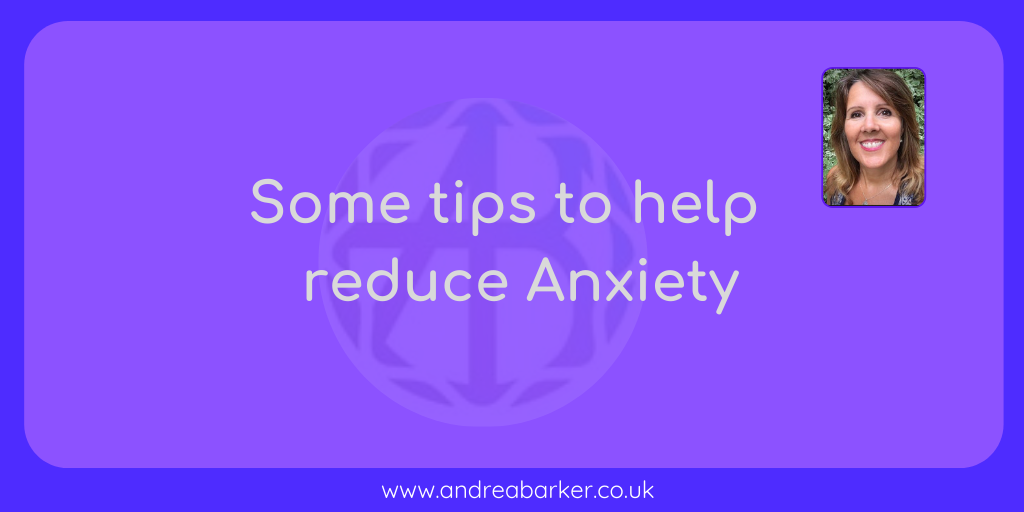
Things that could help:
- It is remembering that the terrible situation that is happening in Ukraine is beyond your control.
- Try to focus on the things you are in control of – like limiting watching the news, to perhaps once a day, and not before bedtime. Also be conscious of getting your news from a credible source.
- Try to shield young children from the news, maybe have it on when they are not around, their young tender minds can find difficult images especially, hard to process. Try not to avoid the subject altogether though, especially if they show signs of worry – as mentioned – reassure them, extra cuddles and a teddy they can tell their worries to and hug. Find out what they have learnt at school, do they know where Ukraine is? It can be helpful for younger children to know that the war is quite far from them.
- For older children do listen to their concerns. Try not to say; ‘everything will be alright’ have a conversation and explain what is happening in as sensitive a way as you can and about your concerns, but also what things you CAN do. You can advise them to limit their online activity. Depending on their age – possibly no internet / phone at bedtime
- Find out what things you CAN do locally to help – from donations of hygiene goods, clothes, and toys, at community centers, school, colleges and churches.
- Could you donate to larger organisations like The Red Cross, UNICEF or Save the Children?
*This can help you – as you are doing something valuable to help victims of the crisis – how ever big or small – it all collectively helps.
- Maybe you are in a position to welcome families or individuals from the Ukraine? Find out what is happening in your area.
Focus on other things that are in your control too, that will help reduce your anxiety levels
- Get out into green spaces and the fresh air
- Exercise
- Try mindfulness and be quiet and just breathe
- Get enough sleep 7- 8 hours
- Eat well and stay hydrated
- CONNECT with others – you don’t need to be alone with how you feel
- Think about what & who you are thankful for
- You can also get extra help, support and ideas from so many wonderful organisations, the BBC have a helpful page on their website, there is Mind, Anxiety UK and many others
Andrea
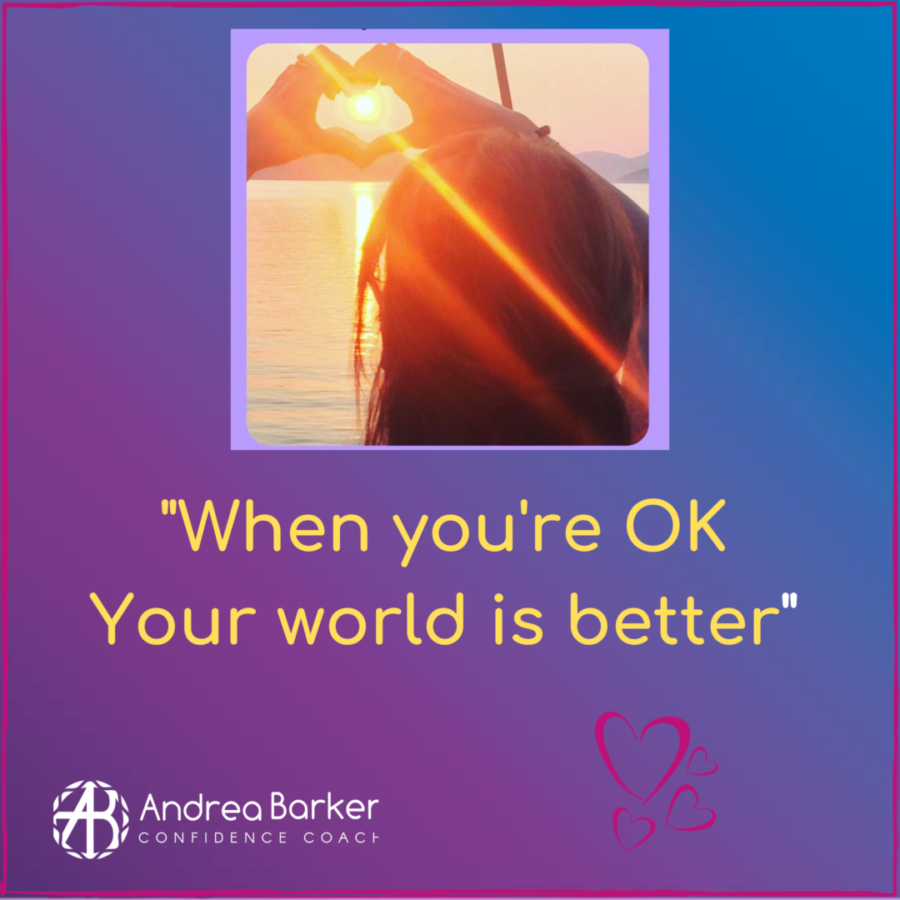
Why do I procrastinate?

Ever asked yourself ‘why do I procrastinate?’
Is procrastinationg stopping you doing the things you really want to do, or really should be doing? Do you feel like your dreams are slipping away from you? Would you like to find solutions as to why you may be procrastinating? Here is some inforamtion, you can request my EBook if you would like to know more.
Stop your procrastination crushing your dreams
It is a normal process that most people go through – a form of contemplation, to decide whether to do something or not. This stage can sometimes become prolonged, due to fear, or being unsure and not feeling very confident, so that procrastination takes over leading to a job or task not getting done.
When procrastination becomes a real problem, is when this process happens often, leading to chronic procrastination. This can quite markedly affect our Self-esteem, and lead to us losing confidence and not allowing ourselves great experiences or opportunities. Like a new job, going for a promotion, dating, or joining in on things we enjoy. Or not ever showcasing what we can do and let the world see how talented we are.
There are many reasons from; Low Self =-Esteem, ‘Perfectionism’ Overwhelm, lack of effective planning, not having the right skills, being too distracted or bored even.
As many reasons as there are for procrastinating is matched by solutions. So, you can answer the question ‘why do I procrastinate?’ Once you inderstand your reason for procrastinating a little better, and have some solutions to work with, you can get going…
Some Solutions:
Learning how to plan effectively, using tools to help you.
How to break tasks or projects down into achieveble steps.
Prioritising tasks – to help you be more organised and avoid overwhelm.
Developing your confidence, recognising your skills and knowing when to ask for help.
Learning how to say NO.
Delaying gratification – this is about rewarding yourself after a task has been completed.
I have developed an EBook to explain more. There is so much to help you understand and to be able to fix your procrastinating and live a fulfilled and happier life, which puts you back in the game!
Please email me if you would like the free EBook with a lot of very useful information in it at: confidencececoach@andreabarker.co.uk or use the ‘Request an Appointment’ button and ask for the EBook
Andrea
Why not LIKE my Facebook page 🙂 https://www.facebook.com/AndreaBarkerConfidenceCoach/
Many people ask ‘How do I gain confidence in myself?’
When you lack Confidence, it can seem like you may never develop it, or regain it.
We can all lack confidence in some areas, and feel fine in others. Like; being ok in a close friend or family group, to feeling panicky at the thought of standing up and talking about ourselves in front of others!
There are times in everyone’s life, where life events can seem to sap your confidence. Being out of work for sometime due to illness or redundancy. Maybe having children, moving to a new area, or country, and starting work for the first time.
There are times when low confidence can seep into everyday and starts to prevent you living life fully. Meaning you may miss out on opportunities, because you don’t feel confident enough to put yourself forward.
If you suffer with a lack of confidence, one thing to know is you are not alone. It is more common than you may think, even though some people seem very confident, that doesn’t mean they are!
Three small things that you can do, that start to increase your confidence:
- write down a list of all you have achieved from being young. Learning to ride a bike, or swim, playing a sport, dancing, for example. Or learning an instrument; getting badges from youth groups; learning to cook – even something very simple; to sew / woodwork and make something. Any certificates you have, learning to drive, to type, to read and to write! The first time you did a journey by yourself; overcoming illness or tragedy; getting your first job or work experience, helping others, friendships, being there for family and friends… the list goes on.
- Get a little notebook, and every day for 21 days – write down 3 things each day that either made you laugh or smile and feel happy, even if only for a moment. Then after 21 days read them all back and then carry on if you want to. This is great to do with children near bedtime; just ask them what made them laugh today and see what they say!
- Watch a film, programme or comedian that makes you laugh out loud! Laughter is contagious and it helps us reduce stress and live in the moment, and the feeling lasts.
Try and see how you feel.
The next steps would then be to very gently step out of your comfort zone, and try a small thing like complimenting someone else, and making them smile.
Arrange a day out to visit something very different, a train journey to the city or beach; an exhibition; or animal sanctuary; a theme park. Even though your heart may beat a little faster, tell yourself ‘just do it’. **Go with supportive people, or on your own. This is about gentle steps, not anything that makes you feel terrified. Do your planning on times of journey’s there and back, opening times, distance to venues etc… and have some fun.
I hope this helps in some way
Andrea
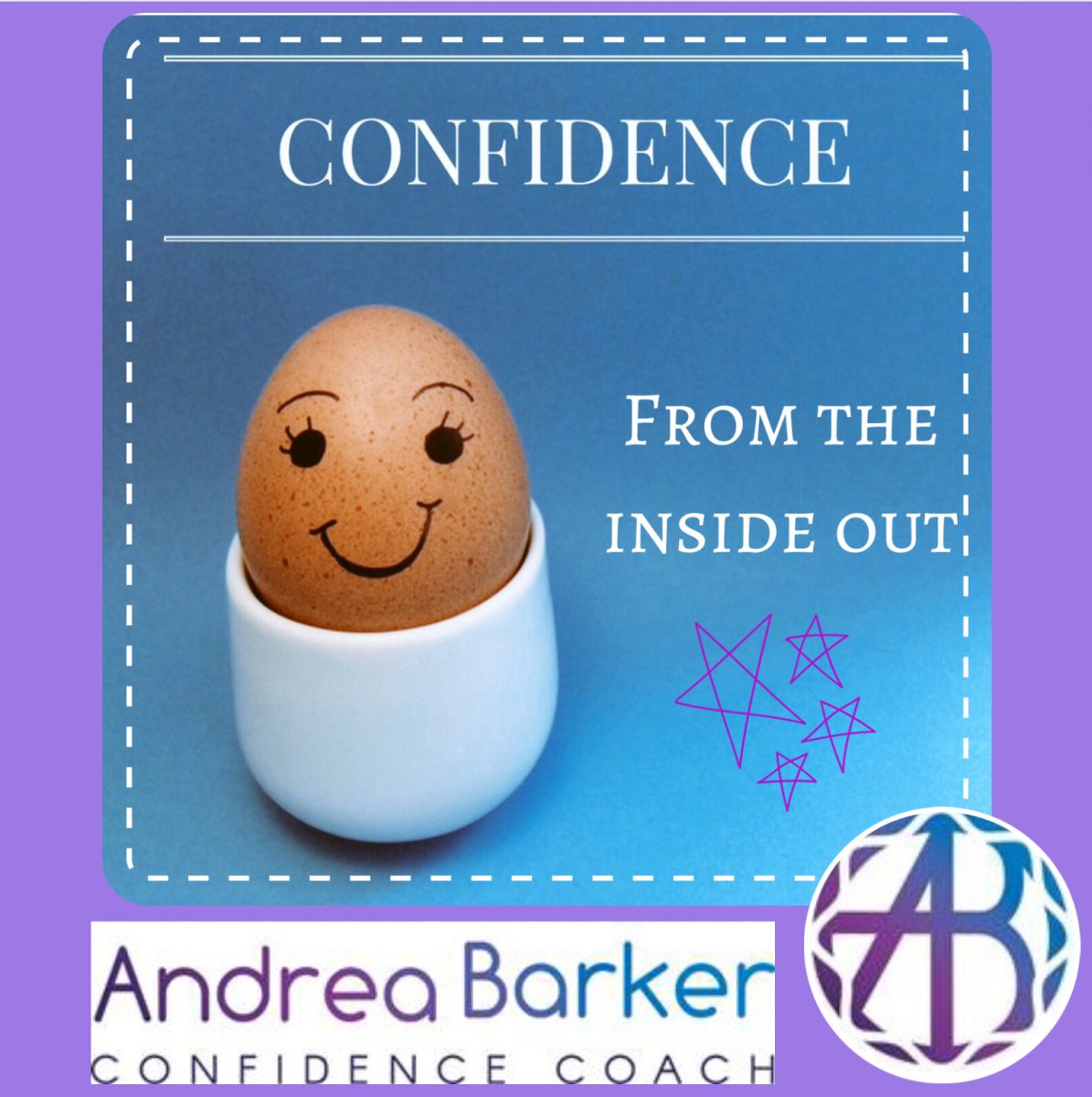
week 2 of Confidence to be your best you
we have covered such a lot today, including Self-Limiting beliefs and how to re-frame them.
why we fear change – and even though we start a change, why we may not continue and then strategies to help you move forward with the changes you want to make, and how to sustain the change
Also – about how to look after YOU, being your own best friend, giving yourself a break, and ME time, and scheduling it in to your diary as essential!
and how to have the confidence to say NO and the positive impact that can have for you
Andrea
developing confidence in yourself can be positively life changing
You can learn to be more confident in yourself and your abilities, to help you in all areas of your life.
have a look at my YouTube video clip – Andrea
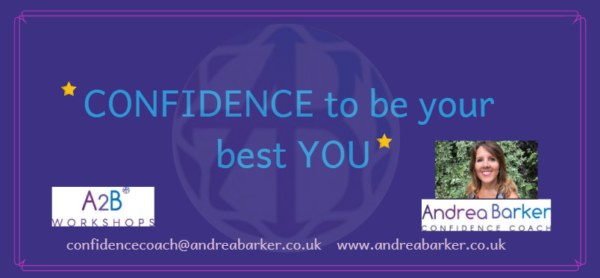
Fear – Friend or Foe?
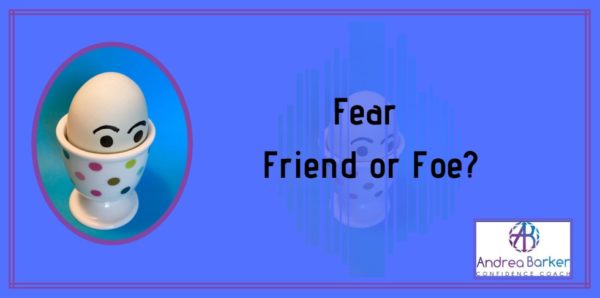
Have you ever felt incredibly nervous, with a racing heart and butterflies in your stomach?
Have you ever felt ridged and sick with fear?
How about terrified and excited all at the same time?
Ever wondered why?
Our mission in life is to Survive and to Thrive.
Survival for us means many things, not just surviving threat to life, but surviving well, so we can also thrive, grow and develop, and procreate (keep our species alive). Some ways we survive are by staying hydrated, having food and shelter. To literally stay alive from threat, we need to know what a threat is to our safety, and to know Fear. So, Fear crucially keeps us safe, by alerting us to Danger.
In situations where our safety or life is under real threat, and those closest to us, then Fear is definitely our friend, because if we did not have any fear or the ability to detect a threat or know what a threat is…then we could count on the odds of our demise being pretty high!
The reason why Fear can make us FEEL ‘sick’ or have butterflies, have a racing heart, and breathlessness, is because a hormone called adrenaline, is released into the blood stream from the Adrenal Medulla, at the sign of danger or threat to our safety or those we love, and sometimes also towards others, or animals, in danger and under threat.
This hormone is responsible for getting us ready to take action quickly, in order to survive the imminent threat. It is called the Fight Fright Flight response. There is then a sugar surge to produce energy, increase blood flow to the larger muscles, diverting attention away from the stomach and any digestion needs not essential right now, to get you ready to run or fight, dilation of your pupils – to see better, and an increased heart rate and breathing to increase the oxygen flow to help you flee, or fight. This is called a ‘physiological’ response in the body, where there are physical changes in or to the body. It is all part of the Sympathetic Nervous System, that is finely tuned to help us survive threat, and relies on all of our senses (sight, touch, smell, taste, hearing and our intuition – our intuition being a combination of many senses and experiences) for the information to be sent, to alert us to a threat or potential threat to our safety.
When the threat is a real one, we will respond very quickly by; running to safety and avoiding the potential threat, which is Flight, hiding or climbing out of the way, maybe it is a case of Fighting your way out of a situation, like a burning house, or having superhuman strength, you hear of people lifting cars, or maybe it’s Fright or Freeze, where your survival depends on staying very still, or stopping dead just before disaster – like the edge of a cliff, and you need every muscle in your body to respond. In this type of situation, our adrenaline and the physiological responses are utilised, and once the threat is over, the Parasympathetic Nervous System takes over, lowering the now not needed adrenaline and returning the body back to ‘normal’. We can sometimes go into shock and shake and feel very sick and light headed when it has been a heightened situation, but generally, it does not last – however the memory of the event does, and we bank every detail, to ensure our survival in the future.
Mostly though, our survival is less dramatic.
We are wonderfully complex and amazing, and when you think how little we generally actively consciously think about how we get through the day, cruising through it uneventfully from morning to evening, and all that actually goes on within our subconscious mind and body’s to allow this to happen, without us giving it a second though, like; Breathing, digesting food, regulating our sugar levels and body temperature, pumping blood and nutrients around our bodies – to every single cell, constant renewal of cells and use of energy where it is needed and processing safely what we don’t need, even when we are sleeping, and calculating and avoiding risks as we go about our daily tasks.
We don’t question things, until maybe the smooth operations falters in some way. Even then, we are miraculous in our ability to recover situations, and recover physically, learning what works and what doesn’t and then applying it in the future, to lessen further risk.
As human beings, from the moment we are born – we are wired to Survive, to survive from threats to our life and well-being, in the best way we can. Some of this survival is instinctual, like a baby being able to cry at a staggering 130 decibels, to ensure they are not ignored, that they are fed, watered and nurtured and kept safe. Other survival strategies we learn as we grow, through different experiences and being taught techniques, and what to do to help us survive well, and reduce risk of threat, by learning to risk assess situations, so we can for the most part live life without incident. For example: crossing the road safely, assessing the road whilst driving, not exiting a moving vehicle, not walking into a Lion’s den, or walking off a cliff, putting your finger in a live electric socket, and relying on your assessment of many situations from past experience and those that just don’t feel right.
Beyond our survival is then the need to Thrive, to feel safe and comfortable, and as humans we also all seek pleasure. Feeling good about ourselves and situations is important, and doing the things we like, eating what we like, wearing what we like, watching what we like, being with people we like vs what we don’t like. Most of the time though we have a calm equilibrium to life, which we appreciate more when it has been disrupted or absent.
All humans have smiling and laughter in common and being / feeling happy is generally our preferred state. Being happy is very much dependent on how we are surviving and thriving and not a means for survival, (though arguably could be deployed as a tactic) because if our basic need to survive well is not being met, then we are in a different mind ‘state’ to happy, like feeling unhappy, sad, stressed, anxious or fearful, angry or frustrated, or maybe just tired, hungry and thirsty. (What constitutes ‘happiness’ is individual to each of us.)
We are mostly able to deal with and resolve most situations in a practical way, without the drama of Fight Fright Flight; like drink some water and eat food and we can consciously use ‘mind over matter’ to move on swiftly in our minds, by way of our thoughts, from one mind ‘state’ and situation to another and get back to feeling happy and comfortable, or getting on with tasks. Our thoughts, and what we think about all situations, affects how we feel.
Building resilience, the ability to ‘bounce back’ or not let one situation affect another, is an important part of surviving and thriving well in a less stressful way, and it is something we can learn to do. We can also learn to switch to happy thoughts quickly or see a situation as just a situation to learn from, in a positive light and not as a threat, maybe even as an opportunity to learn something new. This of course relies on many factors, and experiences, how confident we feel and how skilled we are at not only managing our own survival, by managing and lowering risk, but how we ‘thrive’ and what that actually means to us personally? Whereas we all tend to know what it means to Survive, to stay alive and intact.
So, we know about Fear being our friend, and helping us to survive.
Can Fear also be Foe?
Technically, no it can’t, because it helps us to Survive. However, at the beginning of the fifth full paragraph I wrote ‘When the threat is a real one…’
Fear can be Foe, when the threat is not real to our survival, but in many ways hinders our ability to thrive effectively and happily, because of the response to it, and the anxiety experienced associated with having the Fear.
As humans, our thoughts relate closely to how we feel. If we feel fear, it feels very real to us, and due to the power of our thoughts, the threat does not have to actually be real, we just need to believe it is real in our mind, to create a response in our body, and our body will respond to the perceived threat. So, what happens?
Yes, adrenaline is released to get the body ready to Fight Fright Flight, even if our logical mind knows the threat is not a real one to our survival, how we feel, our emotion, takes over, and we experience real changes in our body, like a racing heart and quickened breathing.
Why? because feeling under threat regardless of it being ‘real’ is a threat to us, and our preferred happy state and the desire to not have an experience we don’t like, that makes us feel bad, so the potential of harm is real enough to us to cause a response. This can be due to a number of reasons, like an actual bad past experience, which experience has taught us to ‘fear’ and see as a threat, our perception of the potential threat can be skewed though, and it may take us some time, as an adult, to process the situation for what it is, and risk assess it as a low threat, or not a real threat to our survival. Or the emotion and fear or anxiety is so heightened, that our reasoning and judgement are squashed into an unheard whisper.
Perception is key here, because in situations that have caused us to feel heightened fear in the past, heightens our perception of the situation being a threat, so we may ‘see’ threat, where there is none or little. Of course, these thoughts and feelings are for good reason, and understandable.
The adrenaline has still been released in readiness and has still put the body under stress of readiness, sometimes this adrenaline is used to run, or hide or avoid the potential situation, but not in the way really intended for our survival from threat to our life.
Anxiety is fear of what may or could happen in the future; the ‘what if…it’s bad, I fail, they laugh at me, I die or get injured, I get it all wrong, they don’t like me?’ even though logically, a past event is not ‘evidence’ for what will happen, our fear of what may happen, changes our perception of how to measure the situation as a potential risk, we raise the odds of things going badly in our assessment, and unwittingly raise the odds of the situation going not happening in the best way.
The Fear or Anxiety then becomes our greatest Foe, because in our attempts to stay safe, and lessen threat, and to stay comfortable, and preserve equilibrium, we start to miss out on life, on opportunity, and opportunities to experience some risk and learn to manage all risk better by building resilience, and consequently we don’t Thrive, and may barely really be surviving and we then feel unhappy, and quite often trapped by our own fear, staying within our Comfort Zone, which is very safe and has it is place to help us heal, recuperate and reflect, but it is also a static place of no new experiences and growth.
Generally, we would all agree that there are definite threats to all humans, regardless of your perception of the situation, for example; entering a Lion’s den, or crossing a busy road without stopping and looking first.
Due to our emotions and how we Feel, and how we would prefer to feel; ‘comfortable’ ‘safe’ happy’ any experiences we have to the contrary stays in our memory bank, as a perfectly formed memory, based on our experience – or more crucially – our personal perception and memory of the experience, which may or may not be fact, and how things actually happened. The more we felt unhappy, under threat, an unease, or fearful, the more intense our memory is of the threat to our survival or equilibrium and happiness.
The good news is, we can learn to control the Anxiety and Fear we do not require so intensely, using various techniques like breathing, hypnotherapy, ‘tapping’ and having a good understanding of anxiety and what triggers it, and using various solution focused therapy, and by talking about it. Anxiety is much more common than you may think, and can all have times of suffering with anxiety, where it takes over in certain situation and we feel like we can’t control it.
We do need Fear, to keep us safe, and some level of anxiety is not altogether bad, as the adrenaline produced can kick us into action, and help move us along. Remember having no Fear has its own dangers, and no adrenaline may make us sloths, with nothing getting done and no urgency to reach deadline, or complete tasks!
A thought to leave with you relating to a question at the beginning
‘How about – terrified and excited all at the same time?’ most of us have had that type of experience
Maybe you’re about to go on a roller-coaster, do a parachute jump, run a race, see a scary film, as your choice, because it’s thrilling! Some people enjoy this type of experience more than others, because it is way outside of the Comfort Zone.
When we are excited, what happens? How do we feel? Our heart rate increases, as does our breathing, we can have butterflies in our stomach…Yes! Adrenaline has been released, it is the very same adrenaline, used in when we are under threat or in danger.
Therefore; ANXIETY / FEAR = EXCITEMENT
If the adrenaline is the same, the body’s response is the same, where is it different then? Remember the power of our thoughts?! What we believe – is real to us! And the next amazing thing is: we can choose what we think, our thoughts, and choose how we feel as a result, because thoughts and emotions are related. So next time you feel anxious or fearful – when the threat isn’t absolutely a threat to your survival, ask yourself these crucial questions;
‘Is the threat or fear Real?’ ‘Where is my evidence?’ (a psst experience is not concrete evidence for a future situation) ‘Does feeling anxious help me or the situation?’ ‘Am I Anxious or excited?’ Do I want to feel anxious or excited?!’
You choose.
I really hope you found this article useful, and I must add that this is my interpretation and way of explaining things, to help people understand the fascinating subject of being Us.
Andrea
This article belongs to Andrea Barker Confidence Coach.

